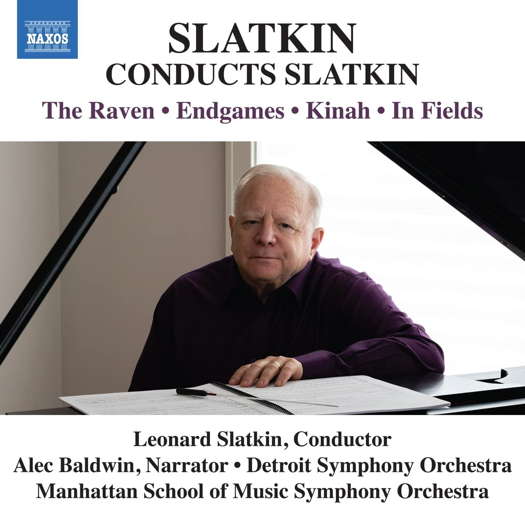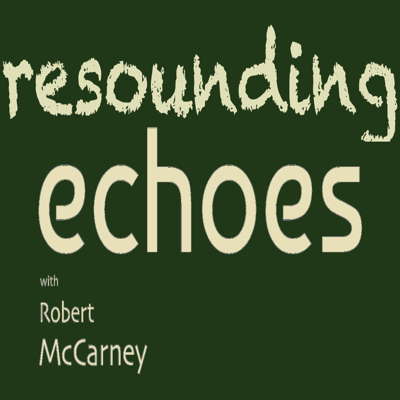PROVOCATIVE THOUGHTS: 
The late Patric Standford may have written these short pieces deliberately to provoke our feedback. If so, his success is reflected in the rich range of readers' comments appearing at the foot of most of the pages.

Noble Grief
Music from Leonard Slatkin and his family, heard by GERALD FENECH
'... a glowing tribute to the Slatkin legacy ...'
Born in 1944, many people know Leonard Slatkin as a conductor, some have even read his blogs and books, and some have even seen him playing the piano. But not many are aware that Slatkin has been active as a composer almost from the time he was born. Granted that his early efforts were in the form of childhood improvisations on the piano and violin, nothing could be taken for granted. But that creative side never abandoned him, and it was the constant urge to compose that spurred him on to what he is today.
When he was at high school he had the opportunity to arrange music for the spring and winter festivals, and this led to composition studies in Los Angeles. Upon graduating from Los Angeles High, Slatkin enrolled at Indiana University as a composition student, but the academic side of the school was not appealing, and after three months the composer called it quits and returned to Los Angeles. Two months later his father died, and Slatkin started to think that music was not his vocation. But fate dictated otherwise.
He was encouraged to follow his father's footsteps as a conductor, and consequently composition was shelved. The next four years were devoted to studying conducting at the Juillard School of Music and the Aspen Music Festival and School.
In 1970 Slatkin learned that the renowned actor Vincent Price was a St Louis native, the city where the composer was working at the time, so he began sketching a piece, The Raven, based on Edgar Allan Poe's works, and Price agreed to narrate the world premiere. The performance took place in May 1971 and it was successful enough to warrant other performances by other orchestras and different actors reciting the texts. In the performance on this album the narration is spoken by the great Alec Baldwin, who brings an intimate energy to the poems. The piece was performed during a concert at the Manhattan School of Music celebrating Slatkin's seventy-fifth birthday.
Listen — Leonard Slatkin: The Raven (The Raven)
(track 6, 0:00-0:56) ℗ 2022 Naxos Rights (Europe) Ltd :
On 6 February 1963, Slatkin's parents were rehearsing Brahms' Double Concerto, but this concert never took place. Sadly, Slatkin's father Felix died two nights later, aged forty-seven. At the memorial service 1,500 people showed up, including Frank Sinatra, who delivered the eulogy. The composer confessed that he had no time to mourn, but the experience of that great loss never left him. Indeed, in 2015 he wrote Kinah, as a tribute to both his parents. Kinah (in Jewish, elegy or lament) is only a thirteen-minute piece, but there is enough noble grief, expressing Slatkin's personal connection with his family's roots.
Listen — Leonard Slatkin: Kinah
(track 7, 0:01-0:56) ℗ 2022 Naxos Rights (Europe) Ltd :
A year before Kinah, Slatkin wrote Endgames, a concertino grosso that celebrates the unsung instruments of the orchestra whose players sit at the far ends of the woodwind section. The piece is cast in three short movements played without pause. The opening gives each soloist a moment to introduce the audience to the sound of the instrument. This is followed by an 'Allegro' that contains the main theme of the piece. The music winds down, and the slow movement that follows is essentially a variant of the main theme. In the final 'Allegro', each of the soloists plays a short excerpt from an orchestral work in which their instruments are showcased with familiar solo turns. Endgames is scored for piccolo, alto flute, English horn, E Flat clarinet, bass clarinet, contrabassoon and strings.
Listen — Leonard Slatkin: Endgames
(track 1, 0:01-0:56) ℗ 2022 Naxos Rights (Europe) Ltd :
This CD includes, among other novelties, In Fields, a composition by Leonard's son Daniel. Born in 1994, the son followed in the father's footsteps. When Leonard stepped down from his music directorship of the Detroit Symphony Orchestra, the members of this ensemble planned a celebratory concert in honour of their conductor. The contents of the programme were kept secret, and in Leonard's recollections, he admits he was not prepared for what was to occur. At the performance Daniel sat in the audience together with his father, when abruptly he asked to be excused. When Daniel did not return right away his father started to worry. Then the announcement revealed that, as a special treat, the orchestra would play a composition written and conducted by Daniel. This work, In Fields, shows the contemplative side of his music, and also speaks of the mutual love of baseball, which is so much ingrained in the national DNA. Leonard admits he does not remember much about that actual first performance because he was sobbing uncontrollably. Now the sentiment is reversed in this recording featuring the Manhattan School of Music Symphony Orchestra, as now the father leads this lovely piece created by his son.
Listen — Daniel Slatkin: In Fields
(track 8, 0:00-0:57) ℗ 2022 Naxos Rights (Europe) Ltd :
This issue also includes a very special musical memento of Leonard's parents who were both instrumentalists of the highest order. Felix Slatkin served as concert master and conductor of the Army Air Forces Training Command Orchestra based in Santa Ana, California. Their primary mission was to create broadcasts to distribute overseas, which programmes were also aired in the States. Brahms' Hungarian Dance, No 17, in which Felix is the violinist, is one of the numerous selections from those radio shows, and the treasure trove of music from that time has yet to be fully mined.
Listen — Brahms: Hungarian Dance No 17 in F sharp minor
(track 9, 0:00-0:59) ℗ 2022 Naxos Rights (Europe) Ltd :
Eleanor Slatkin was first cellist in the Warner Bros Studio Orchestra, and she featured as a soloist on the soundtrack of the 1946 film Deception, playing Korngold's remarkable score written specially for her. In addition to performing his Cello Concerto, she had other solo opportunities in the film. On this recording we have an excerpt of the Haydn Cello Concerto in D, with Korngold himself conducting, and you can hear him counting off the beats at the start of this track.
Listen — Haydn: Rondo (Cello Concerto No 2 in D)
(track 10, 0:00-0:43) ℗ 2022 Naxos Rights (Europe) Ltd :
This album's programme is concluded by three very short pieces by Felix: Fisher's Hornpipe, Wistful Haven and Carmen's Hoedown, the first two in arrangements with Cindy McTee, the third in tandem with Amerigo Marino.
This is a glowing tribute to the Slatkin legacy, impressively compiled and presented.
Copyright © 15 February 2022
Gerald Fenech,
Gzira, Malta

CD INFORMATION: SLATKIN CONDUCTS SLATKIN
ARTICLES ABOUT LEONARD SLATKIN
CLASSICAL MUSIC ARTICLES ABOUT THE USA



